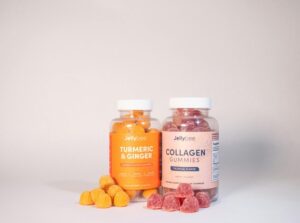
While you might be eager to see quick results from collagen supplementation, it often takes time for noticeable changes to occur. Typically, individuals start to observe improvements in skin elasticity and hydration within four to six weeks of consistent use. However, various factors can influence these outcomes. Understanding the timeline and what affects collagen efficacy can help you set realistic expectations for your journey toward healthier skin, hair, and nails.
Understanding Collagen and Its Role in the Body
Collagen is the most abundant protein in your body, serving as a fundamental building block for skin, bones, muscles, and connective tissues. It provides structure, strength, and elasticity, helping your skin maintain its firmness and preventing sagging.
As you age, your body naturally produces less collagen, leading to wrinkles, joint pain, and decreased muscle mass. This decline can start as early as your late twenties and continues over the years.
Factors like UV exposure, smoking, and poor diet can further accelerate collagen loss. Maintaining adequate collagen levels is essential for overall health, as it supports not just appearance but also joint function and recovery. Recent studies suggest that collagen loading can effectively counteract age-related collagen depletion, making it a valuable strategy for enhancing your well-being.
Understanding collagen’s role helps you appreciate its importance in your body’s well-being and longevity.
Types of Collagen Supplements and Their Absorption
As you consider ways to boost your collagen levels, various types of collagen supplements are available, each offering unique benefits and absorption rates.
The most common types include hydrolyzed collagen, collagen peptides, and gelatin. Hydrolyzed collagen, often found in powders, is broken down into smaller molecules, enhancing absorption.
Collagen peptides, similar to hydrolyzed collagen, are easily digestible and can quickly enter your bloodstream. Gelatin, derived from cooked collagen, may offer benefits but requires digestion before absorption.
Marine collagen, sourced from fish, is known for its high bioavailability, making it a popular choice.
When selecting a supplement, consider your dietary preferences and specific health goals to maximize the benefits of collagen supplementation.
Typical Timelines for Visible Results
While individual experiences may vary, most people can expect to see visible results from collagen supplementation within four to six weeks of consistent use.
During this period, you might notice improvements in skin elasticity, hydration, and overall appearance. Many individuals report a decrease in fine lines and wrinkles, contributing to a more youthful look.
Hair and nail growth may also become more robust, reflecting collagen’s role in strengthening these structures.
To maximize results, consider combining collagen with a balanced diet, rich in vitamins and minerals that support skin health.
Factors That Influence Collagen Effectiveness
Several factors can significantly influence the effectiveness of collagen supplementation.
First, your age plays a crucial role; as you get older, your body’s collagen production declines, making supplementation more essential.
Second, the source of collagen matters; types I and III, commonly found in bovine and marine collagen, are particularly effective for skin and joint health.
Third, your diet can impact absorption; vitamin C, zinc, and copper are vital for collagen synthesis, so including these nutrients is beneficial.
Lastly, consistency is key; taking collagen regularly over an extended period enhances its effectiveness.
Tips for Maximizing Collagen Benefits
To truly maximize the benefits of collagen supplementation, it’s important to implement a few strategic practices.
First, consider combining collagen with vitamin C, as it plays a crucial role in collagen synthesis. Aim to maintain a balanced diet rich in antioxidants, which can help protect collagen from degradation.
Staying hydrated is also essential; proper hydration supports skin elasticity and overall health. Regular exercise can boost blood circulation, enhancing nutrient delivery to your skin and joints.
Lastly, be consistent with your collagen intake—whether through powders, capsules, or foods—since results build over time.






